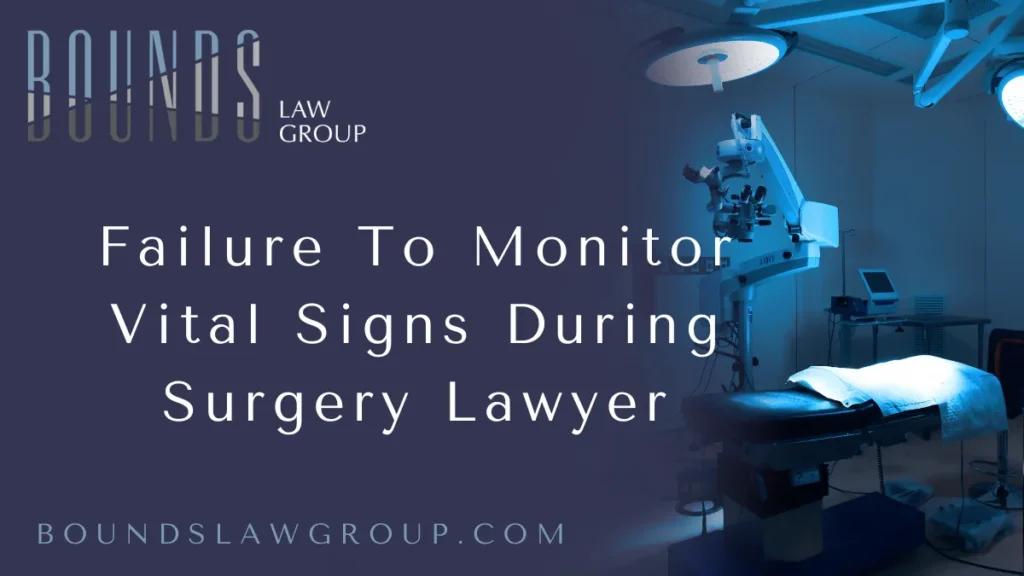
Florida Failure To Monitor Vital Signs During Surgery Lawyer | Bounds Law Group
When undergoing a surgical procedure, patients entrust their lives to the medical professionals responsible for their care. A critical component of this care involves the continuous monitoring of vital signs to ensure the patient's safety and well-being. Negligence in this duty can lead to severe complications, long-term injuries, or even fatalities. At Bounds Law Group, we specialize in representing Florida victims who have suffered due to a failure to monitor vital signs during surgery.
Complete our free case evaluation form or call us now at 877-644-5122 to discuss your legal options.
The Importance of Monitoring Vital Signs During Surgery
Surgical procedures place significant stress on the body, necessitating vigilant observation of vital signs such as heart rate, blood pressure, oxygen saturation, respiratory rate, and body temperature. These indicators provide real-time insights into a patient's physiological status, enabling the surgical team to detect and address potential complications promptly. Neglecting this essential aspect of patient care can result in dire consequences, including organ damage, brain injury, or death.
Consequences of Failing to Monitor Vital Signs
The repercussions of inadequate monitoring during surgery are profound and multifaceted.
- Hypoxia and Brain Damage: Insufficient oxygen levels (hypoxia) can lead to irreversible brain damage if not promptly identified and corrected. Continuous monitoring of oxygen saturation is vital to prevent such outcomes.
- Cardiac Arrest: Unnoticed abnormalities in heart rate or rhythm can escalate to cardiac arrest. Immediate detection through vigilant monitoring is crucial for timely intervention.
- Hemodynamic Instability: Fluctuations in blood pressure can indicate bleeding, adverse reactions to anesthesia, or other critical issues. Failure to monitor and address these changes can lead to shock or multi-organ failure.
- Anesthesia Complications: Anesthetics profoundly affect vital functions. Without proper monitoring, patients are at risk of receiving inappropriate anesthesia levels, leading to intraoperative awareness or overdose.

Legal Implications of Negligent Monitoring in Florida
When medical professionals fail to uphold the standard of care by neglecting to monitor a patient's vital signs during surgery, it constitutes medical malpractice. To establish a malpractice claim, the following elements must be demonstrate:
- Duty of Care: The healthcare provider had a professional obligation to monitor the patient's vital signs during surgery.
- Breach of Duty: The provider failed to fulfill this obligation through negligent monitoring or complete omission.
- Causation: This breach directly resulted in harm or injury to the patient.
- Damages: The patient suffered quantifiable damages, such as physical injury, emotional distress, additional medical expenses, or loss of income.
How Bounds Law Group Can Assist Florida Victims
At Bounds Law Group, our dedicated team possesses extensive experience in handling cases involving the failure to monitor vital signs during surgery. We are committed to advocating for patients who have suffered due to medical negligence. Our approach includes:
- Comprehensive Case Evaluation: We meticulously review medical records, surgical reports, and witness statements to build a robust case.
- Collaboration with Medical Experts: Our firm consults with leading medical professionals to substantiate claims of negligence and to elucidate the standard of care expected during surgical procedures.
- Aggressive Representation: We are unwavering in our pursuit of justice, striving to secure fair compensation for medical expenses, rehabilitation costs, lost wages, and pain and suffering.
Real-Life Implications of Negligent Monitoring
Consider a scenario where a patient undergoes surgery, and the anesthesiologist fails to monitor oxygen saturation levels adequately. As a result, the patient experiences prolonged hypoxia, leading to significant neurological impairment. Such cases underscore the critical importance of diligent monitoring and the devastating consequences of negligence.
Steps to Take if You Suspect Negligent Monitoring
If you or a loved one has suffered due to a failure to monitor vital signs during surgery, consider the following steps:
- Seek Immediate Medical Attention: Address any ongoing health concerns resulting from the surgical procedure.
- Obtain Medical Records: Secure comprehensive documentation of the surgical procedure, anesthesia records, and postoperative notes.
- Consult Legal Counsel: Engage with a law firm experienced in medical malpractice to assess the viability of your claim.
- Document Your Experience: Maintain a detailed account of your medical journey, including symptoms, treatments, and communications with healthcare providers.
Common Defenses Used by Hospitals and Surgeons in Failure to Monitor Vital Signs Cases
When pursuing a failure to monitor vital signs during surgery lawsuit, it is essential to anticipate the common defenses that hospitals and medical professionals may use to avoid liability. Understanding these tactics can help you and your legal team counter their arguments effectively.
1. Claiming Unforeseeable Medical Complications
Hospitals and surgeons may argue that the patient experienced an unforeseen medical complication that could not have been prevented, even with proper monitoring. While complications can arise in surgery, medical professionals are responsible for detecting and addressing these issues promptly. If they failed to do so due to negligence, they should be held accountable.
2. Arguing That the Patient Had Pre-Existing Conditions
Another common defense is blaming pre-existing conditions for the patient's injuries rather than the medical team's negligence. However, even patients with underlying health issues have the right to proper surgical care, which includes continuous monitoring of their vital signs. If a pre-existing condition made the patient more vulnerable, the medical team should have taken extra precautions, not ignored vital signs.
3. Stating That Monitoring Equipment Malfunctioned
Some defendants may claim that the failure to monitor vital signs was due to a malfunction in the monitoring equipment rather than negligence on the part of the medical staff. However, hospitals and surgical teams are responsible for ensuring that all medical equipment is functioning correctly before and during a procedure. A failure to check or respond to faulty equipment does not absolve them of liability.
4. Denying That the Failure to Monitor Led to Harm
Even if a medical provider admits that they failed to properly monitor a patient's vital signs, they may argue that this failure did not directly cause the patient’s injury or worsened condition. Proving causation is a critical aspect of any medical malpractice claim. This is where expert medical testimony and thorough case analysis become essential in establishing a clear link between the lack of monitoring and the harm suffered.
5. Attempting to Settle Quickly for Less Compensation
In some cases, hospitals or their insurance companies may attempt to settle a claim quickly to avoid going to trial. While a fast settlement may seem appealing, it is often an attempt to minimize payouts. Working with an experienced failure to monitor vital signs during surgery lawyer ensures that you receive full and fair compensation rather than settling for an amount that does not cover the full extent of your damages.
At Bounds Law Group, we understand the strategies that Florida hospitals and their attorneys use to avoid liability. We are prepared to counter these defenses with solid evidence, expert testimonies, and a deep understanding of medical malpractice law. If you or a loved one suffered due to a failure to monitor vital signs during surgery, we are ready to fight for the justice and compensation you deserve.

How Bounds Law Group Can Fight Back Against These Defenses
At Bounds Law Group, we understand the strategies that hospitals and their attorneys use to avoid liability. We are prepared to counter these defenses with solid evidence, expert testimonies, and a deep understanding of medical malpractice law. If you or a loved one suffered due to a failure to monitor vital signs during surgery, we are ready to fight for the justice and compensation you deserve.
To get started, complete our free case evaluation form or call us now at 877-644-5122 for a consultation.
Contact Bounds Law Group for a Free Case Evaluation
Understanding your legal rights is paramount when confronting medical negligence. At Bounds Law Group, we offer a free case evaluation form to discuss the specifics of your situation and to explore potential avenues for justice and compensation. Our team is dedicated to providing compassionate and competent legal representation to Florida victims.
The failure to monitor vital signs during surgery is a grave breach of medical duty that can lead to catastrophic outcomes. Patients entrust their lives to medical professionals, expecting vigilant care and adherence to established standards. When this trust is violated through negligent monitoring, it is imperative to hold the responsible parties accountable. Bounds Law Group stands ready to advocate on your behalf, ensuring that justice is served and that similar incidents are prevented in the future.
Sources:
National Institutes of Health (NIH): An article discussing the importance of continuous monitoring of vital signs during surgery and the potential consequences of negligence.
NIH - Continuous Monitoring During Surgery
American Society of Anesthesiologists (ASA): Information on the role of anesthesia professionals in monitoring patients' vital signs during surgical procedures and best practices to prevent harm.
ASA - Anesthesia Monitoring
The Joint Commission: A report outlining standards for patient monitoring in surgical settings and the risks associated with inadequate observation of vital signs.
The Joint Commission - Patient Monitoring Standards

